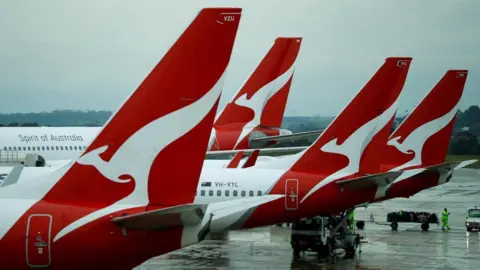**Qantas Faces A$90 Million Penalty for Illegal Layoffs Amid Pandemic**
In a landmark ruling, an Australian court has imposed a hefty fine of A$90 million (approximately £43 million or $59 million) on Qantas Airways, the nation’s leading airline, due to the unlawful dismissal of around 1,700 ground staff during the height of the COVID-19 pandemic. This judicial decision represents a significant moment in Australia’s labor relations, with the Transport Workers’ Union (TWU) celebrating the outcome as the largest penalty against an employer in the country’s history.
The federal court, led by Justice Michael Lee, underscored the necessity of the fine as a deterrent against future violations by other employers. Justice Lee’s judgment emphasized that such financial repercussions should serve as a warning to firms contemplating unlawful employment practices. The court’s decision was keenly awaited, given the implications for both the affected workers and the broader labor market.
The case stemmed from Qantas’s controversial decision in 2020 to outsource its ground operations, a move the airline claimed was essential to ensure financial stability as the aviation sector faced unprecedented challenges due to the pandemic. This outsourcing led to the mass layoffs, which the TWU argued constituted unfair dismissal, leading them to file a lawsuit against the airline.
As per the court ruling, Qantas is mandated to pay A$50 million of the total penalty directly to the Transport Workers’ Union, which initiated the legal proceedings concerning the layoffs. The union characterized the court’s ruling as the culmination of a prolonged legal struggle, dubbed the “David and Goliath” battle. They expressed their relief and vindication, asserting that the decision marks a pivotal moment of justice for the loyal employees who held their positions at Qantas with dedication.
In addition to the imposed fine, Qantas had previously agreed to an A$120 million settlement package in 2024, compensation for the unlawful dismissals. This was a conclusion to a series of appeals the airline had undertaken to contest the union’s claims. These previous compensation agreements demonstrate the airline’s acknowledgment of its missteps during the pandemic crisis.
The ruling has wide-ranging implications, as it not only holds Qantas accountable for its actions but also sets a large precedent for corporate governance and labor rights in Australia. The TWU has indicated that this case may embolden other workers and unions facing similar situations to take legal action and fight for their rights against larger corporations.
The aviation industry has been among the hardest hit sectors by the pandemic fallout, and many airlines have had to navigate complex financial landscapes. However, the court’s ruling against Qantas specifically highlights that companies must adhere to ethical standards and labor laws, even under financial duress. It establishes that the necessity of financial strategies does not mitigate against the responsibilities that employers have towards their employees.
As the legal consequences are unfolding, Qantas has been approached for comments regarding the ruling, but no immediate response had been published. Analysts predict that the airline will need to reassess its operational strategies in light of this ruling and how it engages with its workforce moving forward.
This case not only impacts Qantas but also serves as a significant reminder to the aviation industry and beyond about the vital importance of labor relations and the legal framework within which they operate. Ultimately, it reinforces the message that while companies may face immense pressure, they must function within the boundaries of the law, particularly when it comes to employment practices.
The court’s decision has resonated with many, as it embodies the principles of fairness and justice in employment, echoing throughout workplaces across the nation and potentially reshaping corporate accountability standards in Australia.












